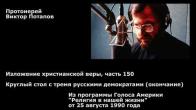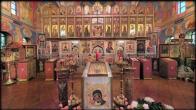ABOUT ORTHODOXY
You are here
The Parables of the Builder of the Tower and the King Preparing for War
In order to live a genuine spiritual life, it is not enough to be fervent; one must become sensible. Without good sense, our fervor alone can turn into "zeal not according to knowledge", and will lead to sad consequences, such as delusion, that is, self-deception (which is spiritual suicide), or fanaticism - an intolerant attitude toward the beliefs and spiritual life of other people.
The holy Fathers of the Church call good sense judiciousness or the gift of discernment, and consider judiciousness absolutely indispensable for success in the performance of good works and in the development of the virtues. According to the teaching of the Fathers of the Church judiciousness itself is an important virtue.
Venerable Anthony the Great writes: "Many virtues are excellent, but sometimes, due to lack of ability or excessive enthusiasm, harm can result from them… Discernment is the virtue which teaches and disposes a man to follow the straight path and not turn off at crossroads. If we follow the straight path", continues the great Egyptian ascetic, "then we shall never be lured by our enemies, either on the right - toward excessive abstinence, or on the left - toward negligence, carelessness and laziness. Discernment is the eye of the soul and its lamp", writes Venerable Anthony the Great. "…By discernment, a man sorts out his desires, words and deeds and steps away from all those which remove him from God".
The genuinely judicious man is one who combines in himself knowledge, experience and insight into the spiritual essence of phenomena. In order to point out to His followers the necessity to be sensible in their spiritual life, Christ gave us two parables - the parable of the builder of the tower and the parable of the king preparing for war. The Evangelist Luke has preserved both of these parables.
For which of you, intending to build a tower, sitteth not down first, and counteth the cost, whether he have sufficient to finish it? Lest haply, after he hath laid the foundation, and is not able to finish it, all that behold it begin to mock him, saying, This man began to build, and was not able to finish.
Or what king, going to make war against another king, sitteth not down first, and consulteth whether he be able with ten thousand to meet him that cometh against him with twenty thousand? Or else, while the other is yet a great way off, he sendeth an ambassage, and desireth conditions of peace. So likewise, whosoever he be of you that forsaketh not all that he hath, he cannot be my disciple (Luke 14:28-33).
In these two parables, the Saviour warns those who have decided to follow after Him of the necessity to calculate their strength and to prepare for this podvig in a proper manner, by developing in themselves the abilities essential for this, and, first of all, self-denial, in order not to be found defeated by spiritual enemies and so as not to renounce the salvific decision.
The main thought expressed by the Saviour in the parable of the tower lies in the words: whether he have sufficient to finish it. These words ought to serve as a stimulus for the Christian toward self-examination and the development in himself, through the exertion of his will, of judiciousness and the virtue of self-sacrifice. We find this very meaning in the second parable of the king who is getting ready for a campaign. Moreover, in this parable the struggle with difficulties and temptations is spoken of which are unavoidably encountered in the performance of good works. In order to overcome difficulties and temptations, one must manifest judiciousness.
In the Gospel according to Matthew (Matthew 8:19-20), we read of a scribe who expressed the intention to follow after Christ, wherever He might go. The Lord saw that the scribe was not ready for the podvig of unconditionally following after Him and that he had need of a more lengthy sojourn under His influence in order to be freed from the prejudices characteristic of the scribes. While not responding to him with a refusal, nor depriving him of the possibility in the future of fulfilling his good intention if it is serious, The Lord pointed out to him His wandering way of life, thereby warning him of the difficulties along the path of following after Him, which, without a certain preparation, could prove to be beyond the scribe's strength. Christ gives the scribe time to think and to become judicious before following after Him.
The parables of the builder of the tower and of the king preparing for war speak not only about good sense, but also about self-denial. Here is why both of these parables are tied to Christ's teaching on bearing one's cross. The core of this teaching is contained in the brief phrase: Whosoever doth not bear his cross, and come after me, cannot be my disciple (Luke 14:27).
The expression take up one's cross or bear one's cross also signifies - to go voluntarily to sufferings and even to death, if necessary. The form of this expression is taken from the Roman custom whereby those condemned to crucifixion themselves bore the shameful instrument of the death penalty - the cross - to the place of punishment (John 19:17), which magnified their sufferings even more.
The Gospel saying, He that taketh not his cross, and followeth after me, is not worthy of me (Matthew 10-38), serves as a warning to all nominal Christians, who outwardly might even be close to the Church, but in whom attachment to the world and absorption in its comforts and cares prevail over love for Christ and over the building of their inner temple, that is, over the perfecting of their soul.
Such is Christ's narrow path.
Christ's path can never be easy and wide, as are all the other paths of this world. Christ's path remains narrow even till now, just as the gates leading to Christ's Kingdom are narrow and imperceptible. It is essential for the Christian to renounce himself, to leave everything behind himself and, not glancing back, to do his work in the Lord's field. The meaning of a Christian's life lies in working together with God in the service of building God's Kingdom. To live in this world according to God's righteousness both in word and in deed and to be its herald means to struggle courageously with life's temptations, to lay one's sorrows and cares on God, to purify one's weaknesses and sins by His holiness and His love. Christ is "not of the world", and because of this the world hates Him, and after Him all His disciples as well (John 15:18-19). The world hated Christ's disciples and will always hate them. The Lord foretold to them banishment, suffering and punishment by death. All of this was fulfilled in the life of Jesus' disciples, who expressed fearful certitude, according to the words of the Apostle Paul, that all that will live godly in Christ Jesus will suffer persecution. But evil men and seducers shall wax worse and worse… (II Timothy 3:12-13).
The disciple of Christ cannot but know why this occurs so inevitably. Only he who becomes little, like a child, can receive the Kingdom of Heaven. To become little means to become meek, guileless, alien to every form of force and pride; but the "world" will in every way beat and revile this voluntary child. Christ brought life and joy to the world, while the lot of His disciples is sorrow, sufferings and afflictions. While woe and suffering exist in the world, this will always be the lot of every unhypocritical servant of Christ. Those who follow Christ cannot be rich in the world, while need and poverty reign in it. A Christian cannot be carefree and merry in the world, when tears and illness are everywhere in it. A Christian cannot be proud, because his every shortcoming is a source not of joy, but of sorrow; a Christian cannot be vindictive, because then he falls away from communion with his Saviour. The follower of Christ cannot act with force, because in this instance he will not walk in His steps in his life. And without all this, without wealth, without satiety, without self-satisfaction, without pride, force and vindictiveness - without all this, what falls to the lot of the Christian if not affliction and deprivations.
And so, sufferings in the life of a Christian are unavoidable and essential. According to the words of Hierarch Ignatius Brianchaninov "…without them, the Christian podvig is inconceivable". But sufferings are salvific only when they are humbly accepted from the hands of God, for God appoints in the general plan of mankind's salvation both a particular individual plan of life and a particular task for each separate soul, not only for the soul that is eminent for its spiritual qualities and service to the Lord, but also for each most modest soul - each small particle of the whole. "Only the Triune, Tri-hypostatic God alone knows everything that is beneficial and needful to each, and which cross he can and ought to bear," writes Ignatius Branchaninov.
In order to know how to bear this cross and to receive strength for bearing it, we must be judicious. Following King David, we must turn to the Lord with the prayer: Cause me to know, O Lord, the way wherein I should walk… Teach me to do Thy will, for Thou art my God (Psalm 142:10-11).
©V. Potapov
PARISH LIFE
RECENT VIDEOS
Address of our Cathedral
Subscribe to our mailing list
While all the materials on this site are copyrighted, you may use them freely as long as you treat them
with respect and provide attribution on the Russian Orthodox Cathedral of St.John the Baptist of Washington DC.









